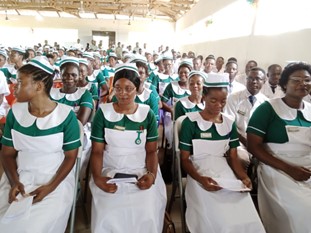The Principal of Wa Nursing Training College (NTC), Christina Terbobri, has lamented the poor performance of students in the institution and other tertiary schools across the country, even though they met the entry grades.
According to her, although many of the students are now coming in with very good grades, they are unable to speak and write good English or solve simple statistical arithmetic computations.
She linked the situation to the ‘chew and pour’ as well as other West African Examination Council (WAEC) examination abuses just to gain admission to the tertiary level. She therefore called for immediate national attention on the space to address this menace.
“Many students with good grades are enrolled into various educational institutions, but cannot construct simple sentences because they only focus on passing the exams and not using grammar in daily life.
“It is common to see students with good grades and single digits enrolled but unable to construct a simple sentence. A student with an A1 in Mathematics, for instance, not being able to spell mathematics correctly, as well as other subjects during an interview. This applies not only to our institution but to the entire country,” she noted.
The principal made these remarks at the school’s 18th matriculation ceremony, held at Wa NTC Hall in the Upper West Region to formally welcome and congratulate the freshmen and women who gained admission into the institution.
The total number of students matriculated was 230, with a gender distribution of males at 61 representing 26.4 percent, and females at 169 representing 73.6 percent.
Touching on the activity’s symbolic importance, the principal emphasised that matriculation is an important event in the life of every tertiary institution as a statutory gathering to formally welcome deserving and eligible applicants who have gained admission into a higher education institution.
“People go to school to acquire knowledge and skills for a better future. The knowledge they acquire enables them to overcome illiteracy; hence, in order to produce competent citizens, skill acquisition must be accompanied by knowledge gain,” she stressed.
Madam Terbobri urged the matriculants to develop self-discipline by first adhering to the Ministry of Health (MOH), Health Training Institute (HTI) and institutional codes of conduct – both written and unwritten – to guide their steps and studies to achieve their set goals of being in school.
“Remember that you are solely responsible for your academic and professional achievements. Though tutors and classmates might help you comprehend, you are ultimately responsible for your own achievement. Motivate yourselves by attending lectures at all times, study regularly in your free time, attend clinical attachments, and participate in all school activities,” she advised.
She added that a good citizen is a person who utilises skills and talents wisely for the betterment of society, hence the need for students to strive to acquire knowledge and apply the same in helping their communities.
Infrastructure Needs
The Principal lamented the absence of dormitory facilities, library space and recommended books, as well as good lighting systems on campus as some of the key challenges bedevilling the school’s quest to train future health practitioners.
She said these challenges have affected the academic performance of students, who are competing with others which have better teaching and learning infrastructure; hence the need for government to urgently come to the school’s aid.










